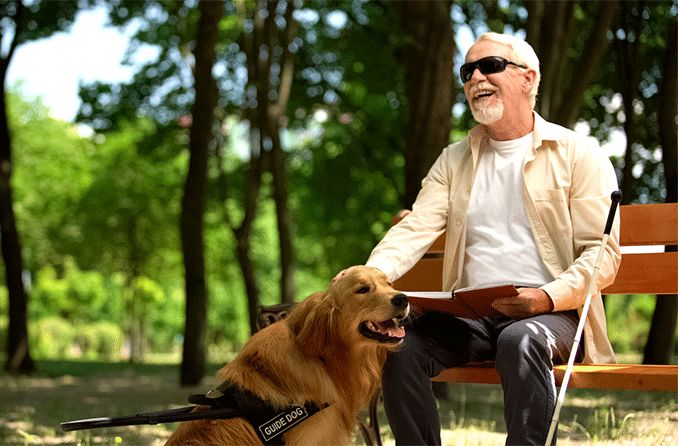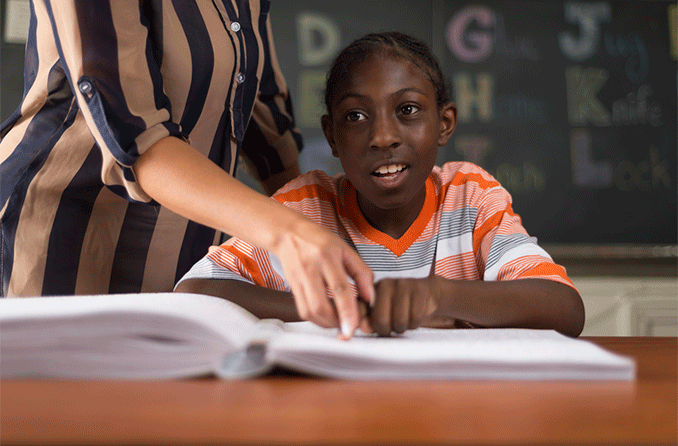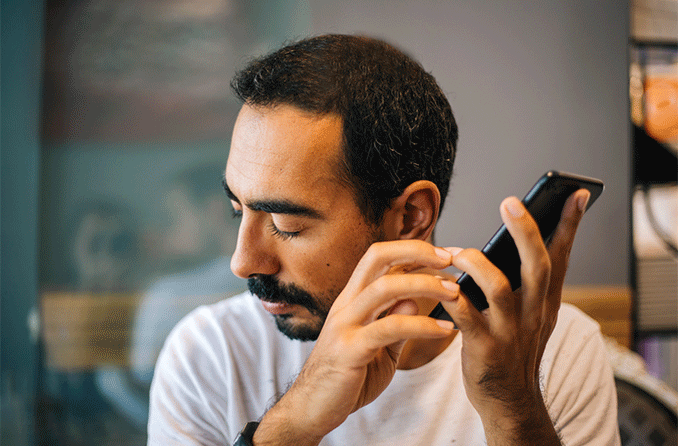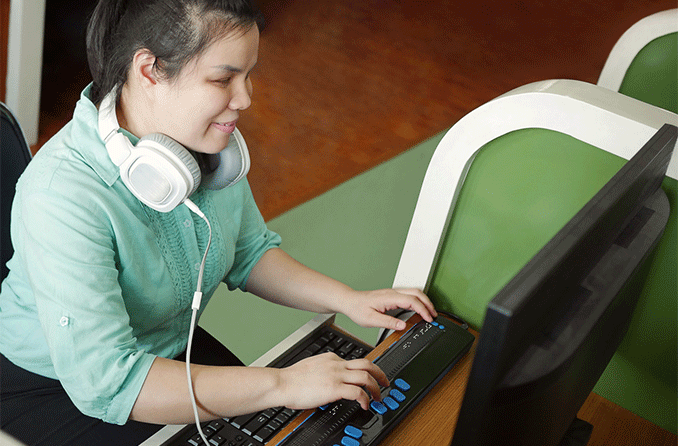Resource Guide for the Legally Blind
- Definition of legally blind
- Causes of legal blindness
- Doctors for the legally blind
- Organizations for the blind
- Schools and scholarships for the blind
- Support groups for the blind
- Tools for daily life for the blind
- Apps for the legally blind
- Guide dogs for the legally blind
- Help and advice for family members of the blind
- Government programs for the blind
- U.S. tax resources for the legally blind
- Helpful links for the legally blind:

This resource guide for the legally blind provides a clear definition of “legally blind” and outlines the support available to help people with visual impairment thrive.
This includes a list of apps, organizations, products, programs, tools and other resources to help the legally blind learn, work and live — from performing everyday tasks to filing their taxes.
Definition of legally blind
The definition of legally blind is fairly straightforward: A person is legally blind if their vision is 20/200 or worse even with glasses or other vision correction. Legally blind is different from low vision, which is vision that is 20/70 or worse with correction.
You may also hear the broader terms “impaired vision” and “vision loss.” Both impaired vision and vision loss refer to reduced sight that causes difficulty in everyday life, even with vision correction. This includes legal blindness and low vision.
A person who is legally blind may be either partially blind — meaning they have a partial loss of vision in one or both eyes — or totally blind, meaning they have complete vision loss in both eyes. One example of partial blindness could be central vision loss caused by macular degeneration.
Causes of legal blindness
There are a wide variety of conditions that can cause blindness. Some individuals are born blind, while others become legally blind at some point during their lives. The leading causes of blindness in the United States are age-related conditions that include cataracts, diabetic retinopathy, glaucoma and macular degeneration, according to the Centers for Disease Control and Prevention.
The World Health Organization offers a fact sheet on blindness and vision impairment, and the U.S. National Library of Medicine offers a guide to blindness and low vision, including information on genetic conditions that can cause blindness.
READ NEXT: Do blind people dream?
Doctors for the legally blind
If your eye doctor has told you that you’re legally blind, or that your child is legally blind, it’s a good idea to ask for a referral to a low-vision specialist. A low-vision specialist is an eye doctor who specializes in working with low vision and legally blind patients.
A low-vision eye doctor has been specially trained in helping low-vision patients and will be up to date on all the best vision aids and tools to help blind patients. A low-vision specialist may be an optometrist or an ophthalmologist.
Here are some organizations you can contact to find an eye doctor for the blind near you:
International Academy of Low Vision Specialists — This association of low-vision specialists can help you find a qualified eye doctor near you.
American Academy of Optometry — This organization for optometrists has a special section for optometrists who specialize in low vision.
The Lighthouse Guild — This nonprofit is dedicated to addressing the health care needs of the blind and visually impaired. They offer health care, vision rehabilitation services, telehealth, support and scholarships for the visually impaired.
You may also try searching online using the term “low-vision clinic” followed by your state or city. There are low-vision clinics across the United States. Examples include the Low Vision and Vision Rehabilitation Service at the Kellogg Eye Center at the University of Michigan and the low-vision clinic offered by the Center for the Visually Impaired in Georgia.
In addition to a comprehensive eye exam, a low-vision center may offer devices and technology to aid any existing vision, training in independent living skills, occupational therapy, and peer mentoring and support.
Organizations for the blind
There are many international, national and state nonprofits, and other organizations set up to help legally blind and low vision individuals. These organizations provide support and offer assistance and programs for blind individuals and their families, teachers and service providers.
National organizations for the blind
The American Council of the Blind is a nonprofit founded in 1962 that advocates for the blind, puts on an annual convention, and offers peer support and legal assistance, including a list of state “white cane" laws.
The American Foundation for the Blind (AFB) is a nonprofit that offers advocacy, publishes the peer-reviewed Journal of Visual Impairment & Blindness, helps to make sure blind children get the resources they need and publishes AccessWorld Magazine, which covers news, products and trends related to visual impairment.
The AFB has partner sites that offer assistance and resources to the visually impaired in various areas. These sites include:
BrailleBug – Educates readers about braille and braille literacy; also offers braille games and braille resources for kids, parents and teachers.
CareerConnect – Provides help for job seekers who are visually impaired. This includes career information, job search help, resources for employers, and tips and advice for succeeding at work with a visual impairment.
FamilyConnect – Gives help and resources to parents of children with visual impairment. This includes advice on adapting your home for a blind child, advocacy through the education system, parenting kids with visual impairment, coping with emotions, and using adaptive technology with your child.
VisionAware – Offers information on independent living with vision loss. The site publishes tips and resources on careers, everyday living, eye conditions that cause blindness and working with visual impairment.
The Council of Citizens with Low Vision International is an advocacy and membership organization for individuals with blindness or low vision. The organization offers several scholarships to individuals with low vision.
The National Federation of the Blind (NFB) is the largest organization run by blind people in the United States. It’s an advocacy and membership organization that also has multiple local branches and is dedicated to helping blind people live their best lives. The NFB has a variety of programs, including one that offers assistance to blind people with any COVID-19 vaccination-related tasks.
The National Organization for Rare Disorders is a nonprofit that provides assistance, information and support to individuals living with rare disorders, some of which can cause blindness. To find a list of disorders that may cause or include blindness, use the search tool at the top of the page to search for the term “blindness.”
State organizations for the blind
The nonprofit VisionAware offers a state-by-state directory of state organizations for the blind.
The American Council of the Blind offers a list of state ACB affiliates.
Schools and scholarships for the blind
There are schools for the blind located throughout the United States.
The Council of Schools & Services for the Blind is a consortium of specialized schools dedicated to teaching and serving blind and visually impaired students and providing resources for parents and caregivers. They offer a list of schools for the blind by state.
The Perkins School for the Blind offers a college readiness program for blind and visually impaired high school students.
The scholarship site CollegeScholarships.org offers a list of scholarships for blind students.

SEE RELATED: How to prepare your visually impaired child to start school or day care
Support groups for the blind
The American Council of the Blind (ACB) offers a wide range of support groups for the blind, along with mentoring. This includes support groups for: blind artists and musicians, assistive technology users, blind and visually impaired students, braille users, guide dog users, blind LGBT individuals, and blind seniors. They also offer mentorship training for individuals interested in mentoring others with visual impairment.
The group MD Support offers information and support to individuals with macular degeneration, which is a leading cause of vision loss with aging.
There are a number of online support groups available through social media. For example, the Blind & Visually Impaired Support Network group on Facebook has more than 9,000 members.
If you’re looking for in-person support from a small group locally, check with your local low-vision clinic or low-vision rehabilitation center. They may host, or will be able to point you toward, a local support group. For example: Vision Rehabilitation Services of Georgia offers a list of low-vision support groups across the state. Currently, some blindness support groups have changed their meeting schedules due to COVID-19.
Tools for daily life for the blind
Products and tools for the blind help vision-impaired individuals perform daily tasks and work. Low-vision and vision rehabilitation centers are a good place to start exploring the products and technology that can help you in your daily life.
The American Foundation for the Blind offers a list of assistive technology devices and products for the blind with information on how to shop for and use these products.
The Carroll Center for the Blind offers an online store with products for blind and low vision individuals. They offer a wide variety of products, including braille books, canes, games, lamps, magnifiers and watches and clocks.
The Braille Institute offers free braille books to blind and vision impaired children.
Apps for the legally blind
Smartphone apps can help the blind and vision impaired navigate the world and do everyday tasks more easily.
The American Foundation for the Blind offers a list of apps for the blind and visually impaired.
Popular apps include Be My Eyes, an app that connects a blind user with a sighted volunteer who can offer assistance via video with routine tasks like setting an oven to the right temperature. The Seeing AI app can help iPhone users by reading text aloud and scanning and reading grocery labels. And the KNFB Reader is a text-reading app available on both iOS and Android that provides optical character recognition (OCR)

SEE RELATED: How to make the internet easier to navigate with impaired vision
Guide dogs for the legally blind
National Association of Guide Dog Users — A division of the National Federation of the Blind, offers an email discussion group, information on rights and responsibilities, resources, a newsletter, and events for guide dog users.
Guide Dogs of America — This California-based organization trains guide dogs, teaches guide dog handling and matches handlers with an appropriate guide dog.
SEE RELATED: How to Get a Guide Dog
Help and advice for family members of the blind
The Kellogg Eye Center offers a list of helpful hints for families of the visually impaired.
The nonprofit VisionAware has A Guide to Vision Loss for Family and Friends of people with vision loss and Guidance for Caregivers of Individuals Who Are Blind or Visually Impaired along with a list of communication tips.
Government programs for the blind
There are a variety of federal and state benefits and programs designed to help legally blind individuals. These range from cash payments to funding for tools and training programs.
Supplemental Security Income (SSI) for the blind
The U.S. Supplemental Security Income (SSI) program for blind, disabled and elderly people with little to no income provides money for basics including clothing, food and shelter.
Social Security Disability Insurance (SSDI) for the blind
For those who have paid enough in U.S. income tax during their lifetime, the Social Security Disability Insurance program pays benefits to you and certain members of your family. You can qualify for benefits if you’re blind, and the Social Security Administration has a guide to Social Security benefits for the blind.
For disability benefits, the U.S. government definition of blindness is: vision that cannot be corrected to better than 20/200 in your better eye, or you have a visual field of less than 20 degrees in your better eye that has lasted or is expected to last more than 12 months.
U.S. government blindness research and resources
The National Eye Institute, part of the National Institutes of Health, leads research on blindness and other eye conditions. They offer clinical trials, information on eye conditions and outreach materials.
State programs for the blind
Many states offer help and even funding to help blind residents. For example, Michigan’s Bureau of Services for Blind Persons (BSBP) offers counseling, help finding training, and services and funding for the purchase of adaptive equipment, computer software and postsecondary education. Your low-vision clinic should be able to point you toward state government programs in your state.
U.S. tax resources for the legally blind
There are tax benefits, credits and resources available for blind and low vision individuals.
U.S. income taxes for the blind
The Internal Revenue Services (IRS) offers some benefits to taxpayers who are blind. For example, the standard deduction for taxpayers who are blind or over age 65 is higher. The standard deduction is an amount that reduces the income on which you are taxed.
U.S. tax forms for the blind
The IRS offers downloadable tax forms in braille-ready formats that can be embossed or read with a refreshable braille display.
Income tax deductions for the blind
TurboTax offers a list of tax tips for the blind, including a list of medical deductions for which blind taxpayers may be eligible.
If you’re seeking specific resources in a geographic area or don’t see the specific type of resource you need, contact one of the national or state blindness advocacy organizations listed here. These organizations should be able to connect you with the resources and support you need. Or, you can ask your eye doctor or low-vision specialist to refer you to local groups and programs.

Helpful links for the legally blind:
Check out this list of doctors and organizations referenced in the article above.
How to find low-vision specialists and doctors for the legally blind:
International Academy of Low Vision Specialists
Low vision and Visual Rehabilitation
Center for the Visually Impaired
Organizations for the legally blind:
American Foundation for the Blind
Council of Citizens with Low Vision International
National Federation of the Blind
National Organization for Rare Disorders
VisionAware — state-by-state list of organizations for the blind
American Council of the Blind — ACB state affiliates
Schools and scholarships for the blind:
Council of Schools & Services for the Blind
Scholarships for the Visually Impaired
Support groups for the blind:
American Council of the Blind — Peer Support and Mentoring
MD Support: The Eyes of Macular Degeneration Community
Blind & Vision Impaired Support Network
Vision Rehabilitation Services of Georgia: Low Vision Support Groups
Tools and apps for the blind and vision impaired:
American Foundation for the Blind — Assistive Technology Products
The Carroll Center for the Blind — Specializing in Low Vision & Blindness Products
The Braille Institute — Special Collection
Guide dogs for the legally blind:
National Association of Guide Dog Users
Government programs for the blind:
Social Security Disability Insurance
Social Security benefits for the blind
Bureau of Services for Blind Persons
U.S. tax resources for the legally blind:
Dependents, Standard Deduction, and Filing Information
Topic No. 551 Standard Deduction
IRS Tax Forms (in Braille and Text Formats)
Common eye disorders and diseases. Centers for Disease Control and Prevention. June 2020.
Blindness and vision impairment. World Health Organization. February 2021.
Vision impairment and blindness. MedlinePlus. April 2018.
White cane laws for states. American Council of the Blind. October 2013.
Helpful hints for families of the visually impaired. U-M Kellogg Eye Center. Accessed March 2021.
A guide to vision loss for family and friends. VisionAware. Accessed March 2021.
Guidance for caregivers of individuals who are blind or visually impaired. VisionAware. Accessed March 2021.
Communication tips. VisionAware. Accessed March 2021.
Page published on Thursday, May 27, 2021






